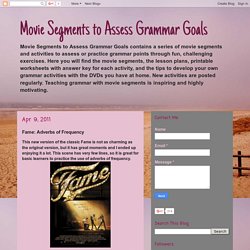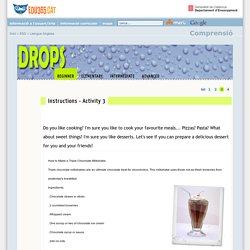

2007 Shrek the Halls. An informal email. U1_The present simple. We use the present simple to talk about repeated actions or events, permanent states or things which are always true.

To find out more about the present simple, read and listen to the conversation below. Can you give me some examples? Yes, of course. We use the present simple to talk about things which are repeated every day, every week, every year, etc. I usually get up at 7 o'clock. I see. Yes, we often use adverbs of frequency sometimes, often, usually or other time expressions like on Mondays, twice a week or in the summer. What about permanent states? Permanent states are situations or feelings which are not temporary. I like him a lot. We also use the present simple for general facts, for example when talking about science or geography. Thailand is really hot at this time of year. So what do I need to know about forming the present simple? The main thing is that the third person singular forms end in -s or -es.
He watches black and white films at his cinema club on Wednesdays. Exactly! Llengua anglesa. LearnEnglish Kids. Cambridge_game_prepare for survival. U1_Sport_The Boy Who Learned To Fly. This ELT lesson plan is designed around the theme of the Olympic Games and a short film based on the life of Usain Bolt film created by Moonbot Studios and commissioned by Gatorade.

In the lesson students speak about sports and the Olympic games, watch a short film, retell a story and write a summary of a story. I would ask all teachers who use Film English to consider buying my book Film in Action as the royalties which I receive from sales help to keep the website completely free. Language level: Intermediate (B1) – Upper Intermediate (B2) Learner type: Teens and adults Time: 90 minutes Activity: Watching a short film, speaking and writing Topic: Usain Bolt, sport and the Olympic Games Language: Vocabulary related to sports and the Olympic Games Materials: Short film Downloadable materials: the boy who learned to fly lesson instructions Support Film English Film English remains free and takes many hours a month to research and write, and hundreds of dollars to sustain.
Step 1 Step 2 Step 3 Step 4. U1_Fame: Adverbs of Frequency. This new version of the classic Fame is not as charming as the original version, but it has great moments and I ended up enjoying it a lot.

This scene has very few lines, so it is great for basic learners to practice the use of adverbs of frequency. A. Watch the segment and check the activities you see in the segme nt: 1. ( ) Dance in the morning 2. ( ) Play a musical instrument 3. ( ) Take the subway to school (work) 4. ( ) Take a taxi to school (work) 5. ( ) Wear perfume (cologne) to go to school (work) 6. ( ) Read a book at school (work) 7. ( ) Go skating to school (work) 8. ( ) Wear makeup to go to school (work) B. Ex: 1. Answer key: U1_Pixies: Simple Present for Routines. U2_Food_Food. U2_Food. Do you like cooking?

I'm sure you like to cook your favourite meals... Pizzas? Pasta? What about sweet things? I'm sure you like desserts. How to Make a Triple Chocolate Milkshake. Ingredients: . U2_Present simple/continuous_The woolly jumper. U5_Past simple_Kitty's school day. U5_Past simple questions_Gran's fishing trip. U20_Families_Penelope in the Treehouse. This ELT lesson plan is designed around a short film by Jonathan Langager for Disney and the theme of families.

In the lesson students watch but don’t hear the start of a short film, decide what is happening and what the characters are saying, predict the rest of the story and write a story. Language level: Intermediate (B1) – Upper Intermediate (B2) Learner type: All ages Time: 90 minutes Activity: Watching a short film, predicting and writing a story, discussing a film Topic: Families Language: Vocabulary related to families, past simple tense. Test Generator.